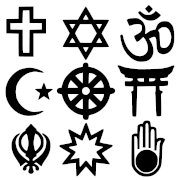Bede Griffiths (December 17, 1906- May 13,1993), life long friend, and once a student under C.S. Lewis, lived as a Benedictine monk in India. There, while remaining a monk, took on the trappings of Hindu monasticism, and entered into dialogue with Hinduism.
His views of harmony between Christianity and Advaita Vedanta are called Wisdom Christianity.
I've not yet sufficiently studied his thought, but I am struck with his views, as far as I know them. One such view is that he sees the Abrahamic faiths of Islam, Judaism, and Christianity and the faiths of the East, such as Taoism, Hinduism, and Buddhism as striking a harmony between monism and theism. I believe he pictures a cross, where the vertical line represents the theistic, and dualistic relationship we may have with God; the horizontal line represents the Oneness, and non-duality that we may realize in the Eastern faiths.
Very intriguing, anyway.
Well, that to me is very interesting, because as Sri Anandamayi Ma (d.1982) taught, that both duality, as experienced in bhakti yoga (devotional), and advaita vedanta which is non-dual are both true, both One. And as a Christian, I am coming to some similar conclusions. I believe that ultimately, only God exists, and from another, both God and the Cosmos exist in relationship.
Also, there is a Muslim saint, or Hindu avatar (as is believed) of Shiva named Sai Baba from the 19th century, who also merged bhakti yoga and advaita vedanta in his approach to both Hinduism, and Islam.
Some preliminary questions I may have are:
1. What is the difference between a Hindu seeking Oneness through Self-realization, and a Christian seeking Oneness by partaking of the divine nature (2Pet 1:4)?
2. Given the psycho-spiritual physiology as taught within Hindu and Eckhartian thought, what occurs to the wicked upon damnation, giving that he is existent because of God's Being, and has been given light in his existentiation?
3. On what level is this Oneness with God accessible, must one first be a Christian?
4. Do Hindus experience the same Oneness that Christians do, but to a lesser, or greater extent?
5. Or are they the same experience?
These are some preliminary thoughts, and questions in this comparison of two great faiths that both teach a divinization in various, or similar ways.
May God lead us all unto Himself.


3 comments:
You have really great taste on catch article titles, even when you are not interested in this topic you push to read it
Your blog keeps getting better and better! Your older articles are not as good as newer ones you have a lot more creativity and originality now. Keep it up!
And according to this article, I totally agree with your opinion, but only this time! :)
One of my friends already told me about this place and I do not regret that I found this article.
Post a Comment